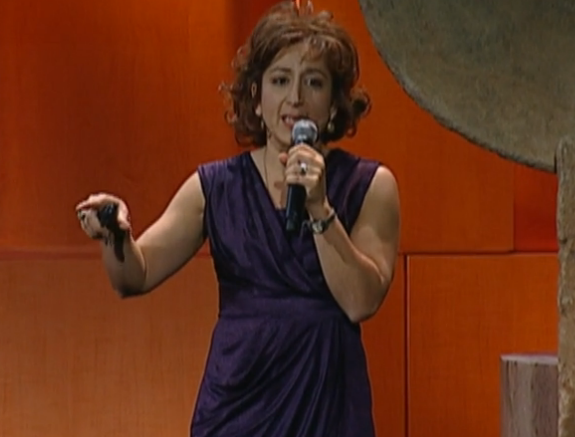Now you laugh, but that quote has kind of a sting to it, right?
你觉得好笑,但是那句话有些刺痛,对吧。
And I think the reason it has a sting
我认为它有刺的原因
is because thousands of years of history don't reverse themselves without a lot of pain,
是因为数千年的历史是不会颠覆,如果没有疼痛的话。
and that's why I talk about us all going through this together.
这也是为什么我谈到我们都将一起经历这个。
The night after I talked to these college girls,
在我和这些大学女孩儿谈过之后的那天夜里,
I also went to a men's group in Kansas,
我也去访问了在堪萨斯州的一个男生团体。
and these were exactly the kind of victims of the manufacturing economy which I spoke to you about earlier.
这些正是制造业经济的受害者,正如我较早前对你们说的。

They were men who had been contractors, or they had been building houses
他们是那些曾经的承包商,或者他们曾建造房屋
and they had lost their jobs after the housing boom,
在房屋建造繁荣期过去之后他们失去了工作,
and they were in this group because they were failing to pay their child support.
他们属于这个团体因为他们不能为他们的孩子支付抚养费。
And the instructor was up there in the class
指导者站在教室前
explaining to them all the ways in which they had lost their identity in this new age.
向他们解释他们是如何在新时代失去他们的身份。
He was telling them they no longer had any moral authority,
他告诉他们,他们不再有任何道义上的权威,
that nobody needed them for emotional support anymore, and they were not really the providers.
没有人需要他们来作为情感上的支撑,他们也不是提供者。
So who were they? And this was very disheartening for them.
那么他们是谁呢?这对他们来说是十分的沮丧的。
And what he did was he wrote down on the board "$85,000,"
他所作的就是在黑板上写下八万五千美元,
and he said, "That's her salary," and then he wrote down "$12,000."
然后他说,“这是她的工资。”然后他写下一万两千美金。
"That's your salary. So who's the man now?" he asked them.
“这是你的工资。那么现在谁是一家之主?”他问他们。
"Who's the damn man? She's the man now."
“谁是那个一家之主?她现在成了一家之主。”
And that really sent a shudder through the room.
那真的使整个屋子颤栗。
And that's part of the reason I like to talk about this,
那也是我想要谈论这个的一部分原因,
because I think it can be pretty painful, and we really have to work through it.
因为我认为它可以很刺痛,我们也的确需要攻克它。












